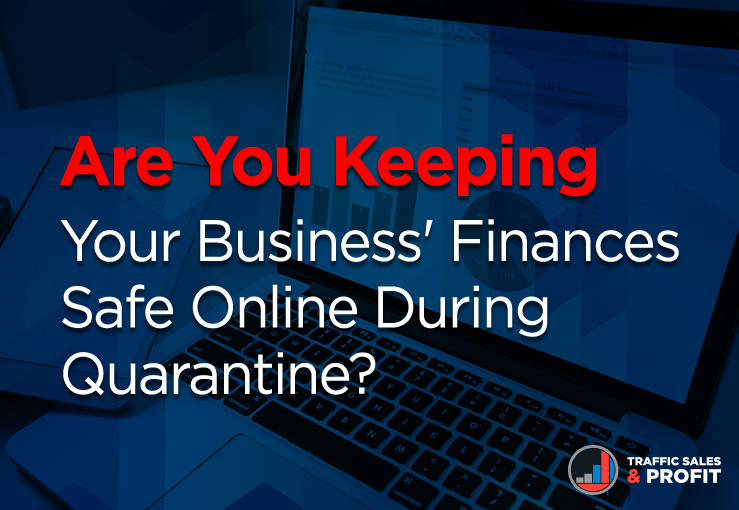Small business finances are a lot like personal finances–very important and easily made vulnerable to cyber attacks if you’re not careful how you use the internet; especially since more hackers than ever are active during the pandemic. The major difference? Losing control of your business finances can make or break your business, literally. In a study done by Fortune in 2018, 66% of businesses attacked by hackers weren’t confident they could recover.
The rate of hacking and cyber attacks are going up more and more each year and getting larger in scale. In order to give your business the best chance possible and remain safe online, it’s important to make sure you’ve got the proper tools in place to secure your business’ financial status.
- Hacking is a Real Problem
- 5 Ways to Ensure Your Business’ Financial Security Right Now
- You Are the First Line of Defense
Hacking is a Real Problem
There’s never been a better time to be on the internet. Especially as a business owner
Trust me, we all know it’s true and completely agree.
But, did you know that in 2020 alone, there have been over 445 million cyber attacks? That’s nearly 3,000 attacks per day and 125 per hour. While certainly the best time to be an online entrepreneur, it’s also the most dangerous.
Hackers evolve with the technology that comes out. In a survey conducted by Thyotic.com, researchers found that 73% of black hat hackers said traditional firewall and antivirus security is irrelevant or obsolete.
That means the people that are ready and willing to steal your records for personal gain are confident in their ability to get past most commercial cybersecurity channels. Simply setting up antivirus and hoping for the best isn’t going to cut it in this modern age of digital mayhem.
In another article on the TSP Blog, What Small Business Owners NEED to Know About Cybersecurity During Quarantine, we talked about how important being aware and staying on top of cybersecurity best practices essential to the perpetuity of your business, its assets and even your own personal data attached to it.
Because most of us aren’t thinking of taking extra steps or adding extra layers to our security online!
You have to be extremely proactive when it comes to cybersecurity as an online entrepreneur, especially surrounding any financial components of your business.
5 Ways to Ensure Your Business’ Financial Security Right Now
It’s impossible to combat every single threat that’s going to come your way on the internet. It’s just a side effect of using the world wide web. However, the stakes are higher when you’re dealing with both your and your customer’s financial information.
Here are a few tips you can take to beef up your cybersecurity arsenal and protect your small business’ finances online:
- Always use secure and unique passwords (and change them regularly!)
According to an article from the BusinessInsider.com:
“Your bank, investment, credit card, and other financial accounts come from companies that use cutting-edge digital security technology. From a secure connection to your browser using Secure Sockets Layer (SSL) to strong security practices in their data centers, bank-level security does a good job at keeping hackers out.”
But, bank hackers aren’t the big problem! Companies that don’t directly deal with bank information are hacked all the time. This means that if you use a common (or even too similar) password on all of your accounts, hackers can get access to what they’d need for your financial information.
Making sure to change your passwords regularly, using a good combination of alphanumeric characters and symbols, and utilizing a secure password manager, like LastPass to keep track of randomized passwords will ensure that even if you are hacked, the offenders will only be able to get into one account, rendering the rest of your
information safe.
- Use third-party payment processors to protect your business’ and customers’ financial information from theft during transactions.
As a small business owner, it’s probably difficult to adhere to certain standards of financial encryption from VISA and American Express like the big grocery and retail stores can. However, you do have several options that you can use to protect not only your financial profile but your customer’s transactions. Outsource payment processing to a company like eBay Inc.’s PayPal unit or Square.
They have done the work of ensuring that their systems are compliant and for a bit of a fee, you can place their stamp of approval on your product offerings. This not only means that customers can feel safe about shopping with you, you can feel safe that if anything happens, you’ve got the weight of the big company that you’re working with behind you if you need to make a dispute or claim.
- Don’t click on hyperlinks in emails that you aren’t sure you opted in to.
Phishing is a common scam involving sending emails that ask the recipient to click on a hyperlink or open an attachment and then enter personal information, such as bank account numbers. However, these attempts have gotten even more sophisticated.
Hackers can disguise themselves as legitimate entities, people you know, websites you trust. A lot of the time, it’s hard to tell the difference between a real and a fake sender. Sometimes these links don’t even require you to enter suspicious information like social security numbers and the like. Simply accessing a site with malware on it through your phone or browser could put everything you are doing on that device at risk.
That’s why it’s extremely important to make sure you know who is sending you emails and only click on links if you absolutely trust the sender.
- Look for FDIC-insured accounts.
Another layer of security for your business accounts is FDIC Insurance. Most commercial banks these days have FDIC-insured accounts. But there are some limitations and parameters that may vary from bank to bank. Take some time to research and discover which bank (and policy) works best for you.
When using online bank accounts, which often offer competitive interest rates on savings accounts, the WSJ suggests you should make sure your short-term savings are in FDIC-insured accounts. This means the government can insure the money for up to $250,000 per owner.
- Schedule a regular financial statement review
Whether you use a financial consultant or accountant, or do most of your own billing yourself, it’s good to schedule out regular financial statement reviews so that nothing slips through the cracks. This can be as frequently as weekly or bi-weekly but we suggest you don’t let a month go by without taking an in depth look at your financial records.
Reviewing credit card and bank statements each month can help you catch any errors, as well as the first sign of potential fraud. If any charges seem incorrect, let your card company or bank know. It will save you a lot of time and energy in the long run.
You Are the First Line of Defense
Your banks and accountants work hard every day to keep your accounts safe. However, there is only so much a 3rd party can do when you are the ultimate controlling factor of when and how your accounts get accessed.
Make sure only essential personnel have access to both business and customer financial accounts. Change passwords regularly and require any staff to do so as well. Set up a time to go over financial information and documentation with a fine toothed comb more often than not.
It’s up to you not to let your username and password slip into the wrong hands. If you do, there’s only so much that can be done to keep hackers out of the most vital part of your small business.
If you follow good practices like the ones outlined in this article, and remain aware of cybersecurity trends related to your business, you should be in the best shape to keep yourself digitally secure.
Make sure to bookmark this article for a quick reference the next time you’re thinking about shoring up some security around your online business finances!
Then, check out our other articles on how you can use this pandemic as an opportunity in your business on the TSP Blog!
Keep in touch with TSP by following and subscribing to our social media pages! Connect with us on Facebook, Instagram, and YouTube for countless tips, additional tools, and most importantly a supporting community.
TSP Facebook Group: https://bit.ly/35ybwKs
TSP Instagram: https://bit.ly/3diGclx
TSP YouTube Channel: https://bit.ly/2L6pzxg















0 Comments